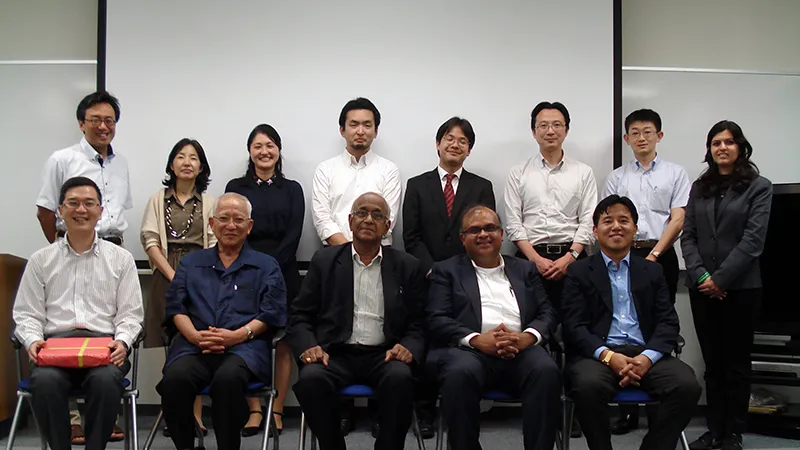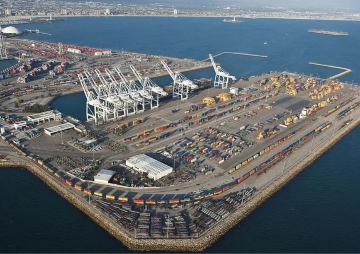There is a strong sense in Japan today that Prime Minister Shinzo Abe and India's new Prime Minister Narendra Modi would take India-Japan relations to a new height, say senior officials and scholars in japan.

The growing convergence of interests between Delhi and Tokyo could turn out to be a factor that would play a significant role in shaping the evolving geopolitical dynamics in the Indo-Pacific region. And, there is a strong sense in Japan today that Prime Minister Shinzo Abe and India’s new Prime Minister Narendra Modi would take India-Japan relations to a new height.
This was noted by Mr. Hiroshige Seko, the Deputy Chief Cabinet Secretary at the Prime Minister’s Office of Japan and a member of the House of Councilors during a meeting with an ORF delegation that visited Japan to undertake a project to study the prospects and challenges of regional integration in the Indo-Pacific region.
During the course of the visit, the ORF delegation met eminent politicians, academics, security experts and bureaucrats to understand the directions of Japan’s new foreign and domestic policies even as the emergence of Asian states in world politics is the single most dominant geo-political feature of the 21st century.
The domestic debates
Like any other nation, Japan’s domestic politics has a significant influence on its foreign policy. A major issue that dominates Japan’s politics is the debate surrounding Article 9 which forbids Japan from using war as a means to settle disputes. In the recent years and particularly under Prime Minister Abe, the issue has gained much salience. The geopolitical significance, internal political hurdles, and implications of the recent initiative by the Abe government to reinterpret Japan’s constitution to allow it to move closer towards "normal state" were discussed at length with several scholars and experts. Further reform, especially to export defence equipment to other states, was an important subject in this regard.
Prof Shinichi Kitaoka of the Research Institute for International Policy Studies explained the issues involved in the government initiative while Prof Yoshihiro Soeya of the Keio University discussed the differing views that existed among various domestic stakeholders. Prof. Ryosei Kokubun of the National Defence University explained the subject in-depth and provided a nuanced analysis of the situation.
Prime Minister Abe’s strategies to stimulate the Japanese economy and to overcome the challenges of the ageing society by increasing the female work force formed a major subject of discussion. By and large, the government’s economic reforms have been welcomed in Japan. Bringing foreign labour to the country could be a good option to address the question of shrinking labour force at home. Opinions on whether the administration should re-open nuclear reactors and resume production continue to be divided. These issues were discussed at a roundtable with scholars of the Japan International Cooperation Agency (JICA) and the Japan Institute of International Affairs (JIIA).
The China factor
Beijing’s approaches to the disputed Senkaku islands and its provocative actions in the East and South China Seas formed major issues of discussion on China and the geopolitical uncertainty in Asia. Since the last few years, China has been aggressive on territorial and sovereignty issues contributing to growing tensions with countries such as Vietnam and the Philippines. On the possible reasons for China’s increasing assertiveness, several views were expressed, including that the new Chinese leadership was probably trying to strengthen its control by raising nationalistic issues abroad. Some were of the view that in order to divert domestic power struggle in China, the new regime was raising territorial issues with its neighbours. Yet another explanation was that China could be probably testing the waters to see how the US would respond. It was noted that the US is today building a "network of alliances" in Asia as a counter to China’s rise. Scholars and experts also noted that with its growing economic might, China’s strategy of using economic coercion to achieve its diplomatic objectives is visible in its engagements with Southeast Asian nations. With its growing power, China has been trying to forge a new regional order that serves its strategic interests.
Japan intends to strengthen the "arc of democracy" and promote engagements with Asian states by strengthening ties with India, Australia and the Southeast Asian nations. These arguments and views were expressed and discussed while meeting eminent scholars including Prof. Akihiko Tanaka of the Japan International Cooperation Agency (JICA), Prof. Tomohiko Taniguchi, Special Advisor to Shinzo Abe’s Cabinet, Prof. Takashi Inoguchi of the University of Niigata Prefecture and Dr. Eiichi Katahara of the National Institute of Defence Studies.
Most Japanese scholars evaluated positively the ever increasing number of security related agreements and partnerships among the countries of the region. These intra-regional arrangements have been fashioned because of the tremendous strategic uncertainties prevailing in the region.
India-Japan relations
The changing geopolitical dynamics in the region have been opening up new areas for India and Japan to cooperate and coordinate policies. The governments too have launched efforts to bring the two Asian states closer. Japan has been involved in some of the most important infrastructure projects in India such as the Delhi-Mumbai freight and Industrial Corridors and the Mumbai-Ahmadabad high speed railway project. JIIA economists dealt with such issues in detail, and also elucidated on the possibility of encouraging the Indian work-force, especially IT professionals, to immigrate to Japan.
Though India and Japan have not yet signed a civil-nuclear cooperation agreement, it is believed that they are inclined to strike a deal before the end of the year. The two have completed four rounds of negotiations and have spoken about the need to expedite such a deal. This hope was shared by academics during a full day work-shop organised at Kyoto University. Scepticism of several domestic lobbies for such an arrangement as India is not a signatory to the Non-proliferation Treaty was also shared. However, according to many scholars, as India was demonstrating "responsible" behaviour and strengthening the global non-proliferation efforts, the chances of the deal being signed had improved.
Prime Minister Abe’s role in engaging with India and promoting bilateral trade and investment continued to draw great interest in all the meetings. Japanese scholars and officials showed immense interest in knowing more about the future trends of the Indian foreign policy. In all, the interactions proved to be productive and were successful in providing the ORF delegation a good understanding of the emerging political, economic and social discourses in Japan’s foreign and domestic policy circles.
(This report is prepared by Rishika Chauhan, Junior Fellow, Observer Research Foundation, Delhi)
The views expressed above belong to the author(s). ORF research and analyses now available on Telegram! Click here to access our curated content — blogs, longforms and interviews.




 PREV
PREV

